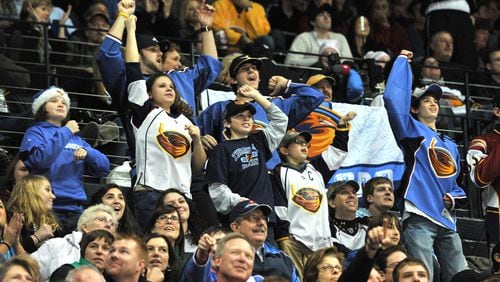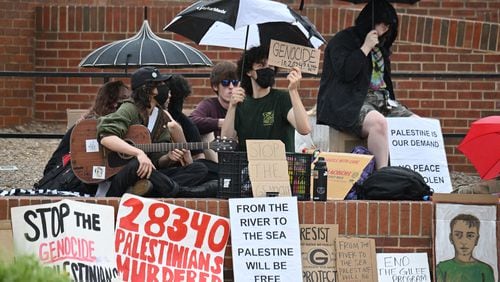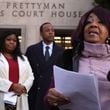Whether it happens that the NHL sets up shop in Atlanta for a third time remains to be seen. But the league and the owners of its 32 franchises know beyond a doubt that interest is strong.
Two groups, one based in Forsyth County and another in Alpharetta, are known to have reached out to NHL commissioner Gary Bettman to express their desire for an expansion franchise in Atlanta (or its northern suburbs, to be more precise). But there’s actually more that have had the league’s ear, deputy commissioner Bill Daly told The Atlanta Journal-Constitution.
“When you talk about Atlanta, we’ve had multiple expressions of interest, and you’re probably aware of some and not aware of others,” Daly said in a phone interview.
He declined to offer more specifics on the number of additional parties or what their plans are. (If you’re wondering, Falcons and Atlanta United owner Arthur Blank is not part of any NHL expansion group.)
“They were all good,” Daly said. “We appreciated their interest. They were prepared; they seemed passionate about having NHL hockey. We were impressed by all of them.”
The competition only confirms what the NHL recognizes – that while the possibility of the league awarding an expansion franchise to Atlanta for a third time may induce some eye rolling among NHL pooh-bahs, the metropolitan area is more than capable of fielding a viable operation.
No one would seek a franchise without confidence it can work, particularly given the cost involved. And there are at least three groups in metro Atlanta that believe strongly enough in the market that they’re evidently willing to fork over perhaps a billion dollars to the NHL just to obtain a franchise. That’s a language that any business can understand.
“I believe the NHL can be successful in Atlanta – or the Atlanta area,” Daly said. “But, again, we’re not at the point of saying we need to add franchises.”
There are a number of steps that any group – whether it’s the one led by car-dealership entrepreneur Vernon Krause in Forsyth County, the one led by former NHL player Anson Carter with plans to build an arena near North Point Mall in Alpharetta or the mystery candidate(s) – will have to take before any pucks drop here.
First off, the NHL is not seeking to expand beyond its 32 teams and won’t alter that stance at least until its situation with the Arizona Coyotes is fully resolved. (Lacking a suitable arena, the Coyotes reportedly are moving to Salt Lake City, although it’s possible the NHL will award Coyotes owner Alex Meruelo another franchise in Phoenix if he can get a new arena built.)
And then even if the NHL does decide to expand – conditions appear conducive to it – there’s no guarantee that league owners would choose Atlanta and any of its competing bids. Houston is among several cities that have expressed interest besides Atlanta, including Kansas City, Quebec City, Cincinnati and Omaha, Nebraska (along with Salt Lake City).
There is a lot to like about Atlanta, but the Houston bid arguably is stronger. First, potential owner Tilman Fertitta has the experience and a track record of operating a major-league franchise as the owner of the Rockets.
As the Flames and Thrashers both demonstrated in their time in Atlanta, a successful franchise needs more than a viable location, a sheet of ice and an owner with the means to purchase a team. While Daly said that Atlanta’s two failed attempts won’t disqualify any current bidders, surely the league will want to have every confidence that a third try would be in the right hands.
Franchise fees could be north of $1 billion. Then there’s the hundreds of millions to build an arena. And then there’s the tens of millions required annually to run it well. And then there’s the necessary expertise and patience to make it work.
“Most importantly, ownership comes into play in making a determination as to whether a club has a chance to be successful over the long term,” Daly said.
While it doesn’t rule him out, Krause has never owned a professional sports team. The Alpharetta group includes Neil Leibman, who is a part owner of the Texas Rangers and the club’s president of business operations and chief operating officer.
Another factor in Houston’s favor is that it has an existing arena, not one that is being pitched. (While State Farm Arena, where the Thrashers played 1999-2011, could still be used for hockey, the option that the NHL would likely favor is a new arena in the northern suburbs, where studies have shown that a franchise would have a better chance of success.)
Renderings and assurances are nice, but it’s not the same as an actual building. The Forsyth project, for instance, ran into a snag in March when county commissioners approved a contribution of $225 million through bond financing to a proposed 18,500-seat arena (contingent on the project landing an NHL team). It was 42% less than the $390 million that they had proposed in a non-binding deal in January. Krause said in a statement that he was “shocked and extremely disappointed” in the changes after months of negotiations and that his team would evaluate whether to proceed. (Talks between the county and Krause’s negotiating team are continuing, a spokeswoman for Krause’s development project told the AJC on Tuesday.)
And while many have assumed that the league would add two teams to maintain an even number of teams – an outcome that would increase Atlanta’s chances – Daly said that “we’re very clear” with interested groups that the NHL could add only one team if it chooses to expand.
“Certainly, it could be two, but it doesn’t have to be two,” he said.
Atlanta could well have a group that has all the qualifications but still get shut out. For instance, it’s conceivable that, after the Coyotes move to Salt Lake City, the NHL could award new franchises to Houston and Phoenix if Meruelo were able to build an arena. And while that would add two teams in the West, the NHL could balance it by shifting Chicago and Nashville to the Eastern Conference.
Could the additions be Houston and Atlanta? Particularly if Meruelo can’t get his new arena, it’s entirely plausible.
And that’s why Atlanta having even more interest than previously believed is potentially an advantage to its chances. With more groups, the better the chance that one of them has the right combination of money, savvy, vision and commitment to convince the NHL that Atlanta is worth the third attempt.
It would be quite the hat trick.
About the Author







